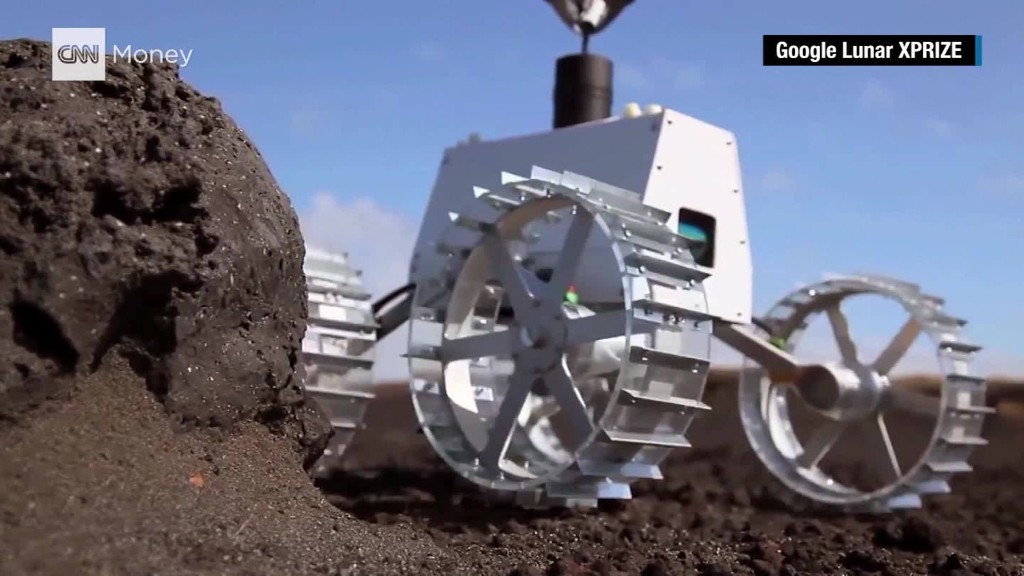
Nearly 50 years after Neil Armstrong walked on the moon, effectively ending the Cold War space race, the next generation of space discovery is nearing its own conclusion.
The Google Lunar XPRIZE launched in 2007 as a way to reignite space exploration.
It challenged teams to land a spacecraft on the moon, have it move 500 meters in any direction, and feed back high-definition video. The first team to complete the mission would be awarded $20 million. The second team would be awarded $5 million, with $5 million more in prizes along the way.
By the beginning of this year, two teams had emerged as the frontrunners: Moon Express, an American team, and SpaceIL, an Israeli team. The two teams, which are privately funded, have until December 31, 2017, to complete the mission.
The creators of the prize wanted to incentivize teams to begin a new era of space exploration. But the history of the X Prize begins long before that.
In 1919, New York hotelier Raymond Orteig offered $25,000 to the first person to fly nonstop between New York and Paris. Several aviators died in the attempt before Charles Lindbergh succeeded in 1927, making him one of the most famous people in the world.
In 1995, entrepreneur Peter Diamindis created the Ansari X Prize, offering $10 million to the first private team to launch a craft into space twice within two weeks. SpaceShipOne claimed the prize in October 2004 on the 47th anniversary of the Sputnik 1 launch.
The Google Lunar XPRIZE, funded by Google (GOOGL), is the next incarnation of these prizes.
SpaceIL and Moon Express both signed verified launch contracts in October 2015, with SpaceX and Rocket Lab, respectively
The launches are scheduled for some time in 2017.
Related: Facebook's giant internet drone nails test flight
"The real challenge will be to run the mission in a way that will overcome all of the obstacles," said SpaceIL CEO Eran Privman. "It's very, very complex to send a technician to the moon to fix some wire that was unfixed," he joked.
Instead of rovers that drive along the lunar surface, SpaceIL and Moon Express built spacecraft that would hop along the surface, using rocket power to move from one spot to the next.
Moon Express's MX-1 craft is designed to be the "iPhone of space," said Moon Express CEO Bob Richards when it unveiled the craft three years ago. MX-1 is supposed to be a flexible tool to explore the lunar surface, which the Moon Express team calls the "Eighth Continent." Moon Express won two X Prize Milestone Prizes totaling $1.25 million for the spacecraft's landing hardware and camera.
SpaceIL designed a spacecraft where every part is multifunctional. The model sits at Tel Aviv's Ben Gurion International Airport. The real thing is supposed to go a bit farther, covering the roughly 400,000 kilometers to the moon.
"The advantage that we have compared to other teams that are doing this is that the space industry here in Israel is focused on very small spacecraft already today," said Privman.
Related: NASA's big bet on Juno will pay off. Stay tuned.
Israel's space industry is a result of what many consider to be the country's first startup: the Israel Aircraft Industries' Lavi. In the early '80s, Israel began developing an advanced, single-engine fighter jet, called the Lavi. The program was canceled in 1987 after the country spent approximately $1.5 billion on it. But the scientists and engineers who had worked on the program took their technical knowhow into the Israeli marketplace. One year later, Israel launched its first satellite, called Ofek.
Privman remembers watching Neil Armstrong's first steps on the moon as a child. The famous line -- "One small step for man, one giant leap for mankind" -- inspires him to this day.
"What we are looking for is to really accomplish the dream that for centuries men are dreaming about, and that is going out of orbit and getting to far away stars or any place like the moon."

